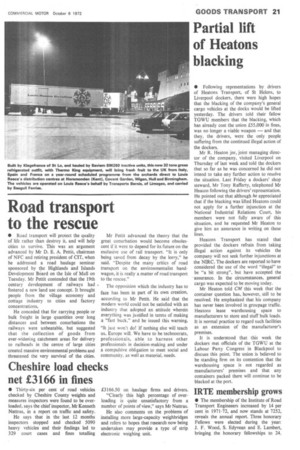Road transport to the rescue
Page 23

If you've noticed an error in this article please click here to report it so we can fix it.
• Road transport will protect the quality of life rather than destroy it, and will help cities to survive. This was an argument advanced by Mr D. E. A. Pettit, chairman of NFC and retiring president of CIT, when he addressed a road haulage seminar sponsored by the Highlands and Islands Development Board on the Isle of Mull on Tuesday. Mr Pettit contended that the 19th century development of railways had fostered a new land use concept. It brought people from the village economy and cottage industry to cities and factory concentrations,
He conceded that for carrying people or bulk freight in large quantities over long distances and between conurbations the railways were unbeatable, but suggested that the collection of goods from ever-widening catchment areas for delivery to railheads in the centre of large cities created massive environmental problems and threatened the very survival of the cities. Mr Pettit advanced the theory that the great conurbation would become obsolescent if it were to depend for its future on the exclusive use of rail transport. "It is only being saved from decay by the lorry," he said. "Despite the many critics of road transport on the environmentalist bandwagon, it is really a matter of road transport to the rescue."
• The opposition which the industry has to face has been in part of its own creation, according to Mr Pettit. He said that the modern world could not be satisfied with an industry that adopted an attitude wherein everything was justified in terms of making a "fast buck," and he issued this warning.
'It just won't do! If nothing else will teach us, Europe will. We have to be technocrats, professionals, able to harness other professionals in decision-making and under a compulsive obligation to meet social and community, as well as material, needs.






































































































